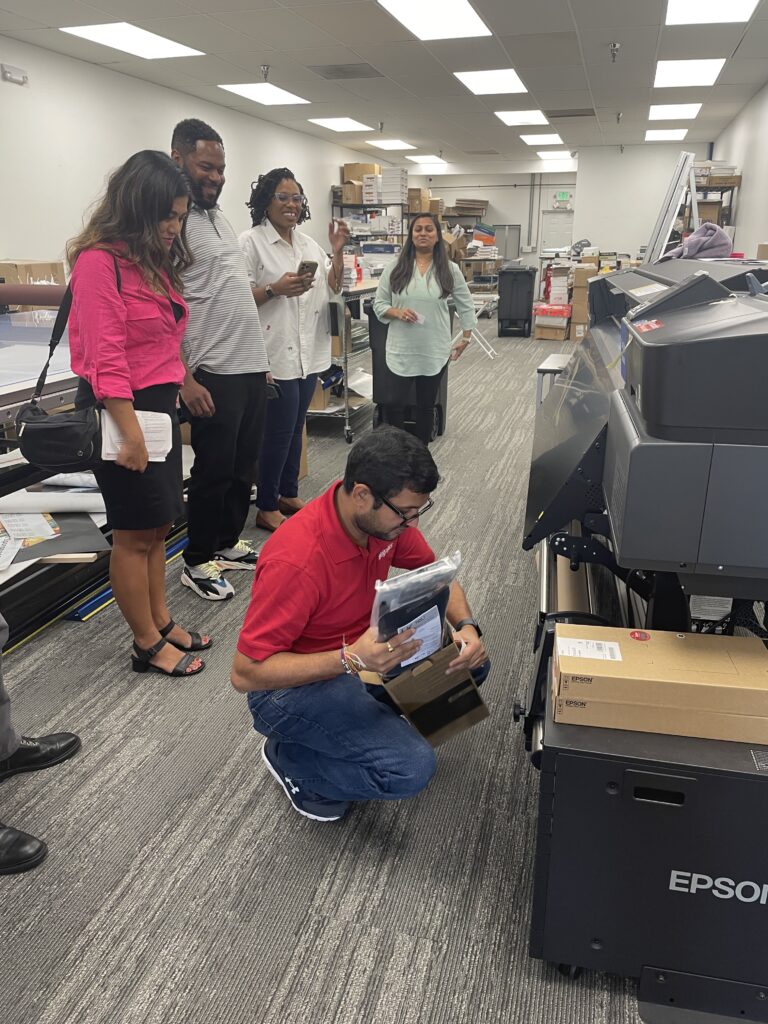by M.B. Humphrey
A full-service print studio, a local childcare center, and a metalworks machine shop in the New Castle County of Delaware all seem to have the same question: How can we better serve our community, our employees, and our families while remaining in compliance with federal regulations and maintaining profitability?
Advocacy representatives recently visited several small businesses in the area. With an agency-wide goal of supporting small businesses as they mitigate challenges and regulatory affairs, visiting business owners on location provides Advocacy the opportunity for first-hand experiences and insight.
Delaware Metals is a machine shop with multiple certifications, just over 25 employees, and machinery worth millions. The company also partners with a local technical college to introduce students to the machining industry and support internship programs.

“It takes about 3 years for a beginner to become fluent in this profession,” owner Scott Bruneau explained. “It’s a highly skilled trade, like an electrician. To run these machines, you basically need to be a computer programmer.”
Bruneau described metal fabrication as an expensive industry to enter, outlining the use of machines that cost over $1 million to acquire and thousands of dollars to maintain. With a $1.7 million dollar payroll, taking home less than $8 per hour himself, he said he often feels he is fighting an uphill battle to ensure his business is successful.
Bruneau pays special attention to proposed rules to ensure he’s on top of anything that may come his way in the future. For instance, as a result of a recent rule, he’s had to change the kind of lubricant they use for the machines.
“Wages went up last year, employee healthcare costs have gone up in the last year, and so has inflation,” Bruneau said. “Now, we must buy a new lubricant for our machines that run us over $1,000 a barrel—and you’re going to need more than one barrel per machine.”
Bruneau stressed how much he loves the work they do and what they can provide to their surrounding community because of the shop. However, he shared, that balancing what he needs to do for business with what’s required of him by the government has not been an easy task.
AlphaGraphics is a print shop offering graphic design, online marketing, and printing services. Deepal Shah and her husband entered the franchise after she spent more than 15 years as a pharmacist. She started the small business to reclaim her weekends and be more present for her family.
They currently employ three people and generally enjoy the smoother day-to-day work of the print shop. As a franchisee, they also must be aware of regulatory changes that could affect them now and in the future. For example, Assistant Chief Counsel Janis Reyes discussed a final rule that would have banned most forms of noncomplete clauses for businesses like franchisees. Most franchisees sign noncompete agreements, which do not allow them to open another similar business. This final rule was supposed to be effective on September 4, 2024. On August 20, 2024, the day of our site visit, a federal court issued an order blocking this final rule permanently and nationally.
They were also able to learn more about the recent overtime rule. Although Shah displayed some initial concern, Reyes explained that they would not be affected by the rule since all of their employees are paid hourly and are eligible to receive overtime pay. The rule affects an exemption from these overtime requirements for certain executive, administrative, and professional workers.
All Beautiful Children Learning Academy is owned and operated by Latoya-Boseman Howie with support from her husband, Jerome. The childcare center hosts kids from ages 3 up to 13. The bright building boasts colorful signage and student photos on every inch of the school walls, a fully equipped break room, and an area behind the school for outdoor play. For the older children who participate in the aftercare program, a small computer lab was created from community donations.
The Howies also had a childcare center in Philadelphia, where they are originally from. They expressed gratitude for the way the surrounding Dover, DE community has embraced the childcare center, but noted that navigating federal and state regulations is both time-consuming and expensive.
“Just to add an additional restroom is thousands,” Howie said. “There’s a fee with the state—an impact fee—of several thousand dollars just to get the addition of another toilet approved. That’s not even considering things like materials and labor.”
Each business echoed sentiments of having no issue with striving for and maintaining compliance. However, expenses and a general lack of clarity on how to navigate certain new requirements is an undertaking for any small business. During these site visits, these owners were able to candidly express their concerns and triumphs while gaining insight into how current and future rules could affect them. They also received relevant information about the regulatory process and how to connect with Advocacy directly when they have questions.
With a mission of being the voice for small businesses throughout the regulatory process, site visits like these provide lasting impact and allow Advocacy to learn a bit more about the people behind the voices they amplify.
